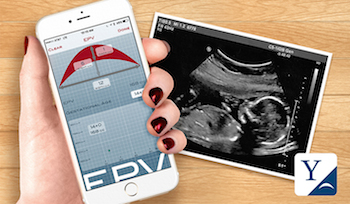 Yale School of Medicine has launched a second ResearchKit study, and the new one aims to decrease the chance of pregnancy loss resulting from an undersized placenta. According to Yale, fetal death affects 30,000 women in the US annually.
Yale School of Medicine has launched a second ResearchKit study, and the new one aims to decrease the chance of pregnancy loss resulting from an undersized placenta. According to Yale, fetal death affects 30,000 women in the US annually.
The study is following up on earlier research done by lead research and director of the reproductive and placental research unit Dr. Harvey J. Kliman, which pointed out many late-term pregnancy losses were linked to very small placentas. He continued that growth of the placenta could be monitored in the same way growth of the fetus is monitored during ultrasounds.
Women who are eligible for the study are asked to track their estimated placental volume (EPV) by recording the width, height and thickness of the placenta into the app, factors they can collect when they undergo a 2D ultrasound examination. When the pregnancy is complete, women will record the outcome of the pregnancy in the app, called EPV.
Kliman aims to use the data they collect from this study to determine whether EPV measurements can be used to predict pregnancy outcome. If researchers find that they can predict this, will also attempt to collect enough data to prove to providers that there is value to adding EPV measurements into routine prenatal care.
“ResearchKit has given me the opportunity to reach thousands of women who can contribute to our understanding of placental volume and pregnancy outcome in a way I never could have done on my own,” Kliman said in a statement. “My hope is that the effort these research participants put into this project will help women achieve the healthiest pregnancy outcomes possible.”
Yale's first ResearchKit app, announced in early October, is a study for people who have or may develop cardiomyopathy, a disease of the heart muscle. Participants can take self-assessments about their quality of life and heart-related symptoms. They also have the option to perform six-minute walk tests that analyze their physical abilities and heart rate trends.
By our count, there are now 14 ResearchKit apps, including this new one from Yale.
In an interview in New York City last month, an Apple executive explained to MobiHealthNews that one of the goals for ResearchKit is to help those building truly medical, smartphone-based interventions to get them to market:
“One way to think about ResearchKit is as the beginning of a pipeline that will lead to more apps that are screening, diagnostic, management and treatment apps,” Bud Tribble, MD, PhD, Vice President of Software Technology at Apple said. “In fact, it is a necessary, essential first step to figure out what is needed to develop these apps — what works and what doesn’t — before you move into, ultimately, clinical study apps and clearance to use them for diagnosis and treatment.”













